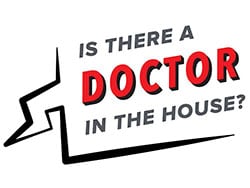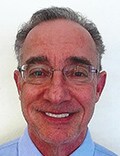
Emergencies happen anywhere, anytime, and sometimes medical professionals find themselves in situations where they are the only ones who can help. Is There a Doctor in the House? is a Medscape series telling these stories.
Several years ago I was at a local college baseball game with my wife and adult daughter. We were sitting down the third baseline, almost in the outfield. The game had been going on for a little bit, and I became vaguely aware of a woman screaming somewhere over on the first base side.

Dr Steven Flynn
In my head, it sounded like the scream you would make if you saw a long-lost friend and you were surprised. But it got louder and louder. It finally entered my consciousness that maybe I had misinterpreted the scream, and I looked in that direction. There was a commotion, but I couldn't tell what was going on.
My daughter, who was seated next to me, caught on that it was a child choking before I did. For a second, I was sort of frozen. And then my daughter said, "Dad!" That snapped me out of it. I jumped up and headed in that direction.
Now, I don't know if all physicians do this, but throughout my medical career, I've always rehearsed situations similar to this in my head. I wanted to know what I would do. One very common situation is someone in cardiopulmonary arrest.
There's an old saying. If an adult is in cardiopulmonary arrest, it's almost always their heart. If it's a child, it's their lungs; something's blocking their breathing. So, as I was hurrying over there, the rehearsal was already playing out my head. I knew what to do next.
This may seem counterintuitive, but in any medical situation, the first thing you do is establish an appropriate doctor-patient rapport. This is true in the clinic when you walk into an exam room. It's true in the OR. And it was true here. I knew I had one opportunity to do that. I would be asking these parents: Trust me and trust the life of your apparently dying child to me. I had to identify myself in a tone that was calm yet also authoritative and reassuring. I'm a doctor. I know what to do.
The situation was what you'd expect: Adults panicking, beside themselves. The child, a very young toddler, was glassy-eyed, just standing there. I could tell she was about to go out. I stepped up and simply said, "I'm a doctor." I got the tone right, and the father immediately said, "He's a doctor. Give her to him."
As they handed the child to me, she went unconscious. She was small enough where I could hold her on my forearm, so I immediately held her head down. I gave five sharp raps to her mid back, between her shoulder blades, trying to dislodge whatever it was that was clogging her airway. Then I put my other hand on top of her back and flipped her over between my hands, like a waffle on a griddle. She was still out.
I did some thrusting on her belly, up under her solar plexus ― nothing. I flipped her over prone again. Five more sharp blows between her shoulder blades. Still a rag doll. I gave her five more thrusts to her belly. In my head, there was this clock of how long she's been not breathing, and I was beginning to get desperate.
I said to myself, I'm going to have to do a blind sweep in this child's throat, which is not what you want to do. I flipped her over face down again and gave her five more sharp raps.
And on one of those final pops, the particle dislodged. I didn't see it come out, but someone else told me they saw it.
I was getting ready to do the blind sweep of her throat when her hand squeezed my pinky.
I thought, Oh my God, thank you.
She stirred. I handed her to mom and said, "She's going to be fine."
Someone said, "We've called an ambulance. Should we cancel it?"
I said, "No, don't cancel the ambulance." And then I just sort of walked back to my seat.
As I was walking down the first base line and around home plate, the crowd broke into polite applause. It was like at a golf tournament. Like I had just made a two putt for par. I was thinking, Do I wave? Do I tip my cap? Do I nod? What's the protocol for this? I have no idea. So, I sort of vaguely waved at folks. Then I went and sat down next to my wife and daughter, and we watched the rest of the game.
I didn't sleep well that night because I had no idea what happened with the child. The same two teams played again the next night. I went back hoping to run into someone who might know something. It's a small town. The wife of the baseball coach managed to figure out who I was. She told me the child was fine. They checked her out at the hospital. She had no memory of the event. Thank goodness for that.
It occurred to me, why did I walk off after it was over? Why didn't I stay and make sure the child was okay until she got into the ambulance? That was dumb. I couldn't figure out why I did that.
And then I finally realized, I've gone over this many times in my head, stepping up, establishing rapport, bringing the child back to a stable cardiopulmonary status. But my rehearsal always stopped right there. I never rehearsed what to do afterwards. So, I thought, I need to go a little farther. What do I do after the acute event?
You'll notice that when I established rapport, I said, "I'm a doctor." What I did not say was, "I'm an ophthalmologist," because I don't know how much confidence that would've inspired in anyone. That's another thing I had rehearsed. Don't worry, the ophthalmologist is here, wasn't going to carry the day.
The baseball coach called me the next day and said, "I heard what you did, and thank you so much. We want you to throw out a first pitch." But the following week the pandemic hit. All baseball was canceled, which is probably all for good, because no one needs to see me throw a baseball.
The coach got my name and number to the father of the child. He's a local high school football coach. Not long afterward, I met the family. They now celebrate the child's birthday twice, her regular birthday and then that day as her birthday as well. They send me photos of her on that day with her cookie cake, getting the icing all over her face. She's a beautiful little girl.
I'm grateful it turned out well, but I really hope I never have to do that again. I felt okay in the moment because of the rehearsal. That's what got me through it. I didn't have to think. Other common things like choking in a restaurant or going down from an apparent heart attack, I've rehearsed those situations as well. I have game plans. But I really hope I never have to use them.
Steven Flynn, MD, PhD, is chief ophthalmologist and professor of ophthalmology at Ochsner LSU Health — Monroe Medical Center in northeastern Louisiana.
Are you a medical professional with a dramatic story outside the clinic? Medscape would love to consider your story for Is There a Doctor in the House? Please email your contact information and a short summary to access@webmd.net.
Read more in the series:
A Baby Stops Breathing at a Grocery Store – an ICU Nurse Steps In
A Surfing PA Leads an Intense Beach Rescue
Emergency Birth on a Plane: Two Doctors Earn Their Wings
A Doctor Must Go to Extremes to Save a Choking Victim
A Doctor Intervenes in a Fiery Car Crash
A Freak Impalement by a Model Rocket has This Doctor Scrambling
A Remote Mountain Bike Crash Forces a Doctor to Take Knife in Hand
A Doctor Saves a Drowning Family in a Dangerous River
A Hiking Accident Becomes a Helicopter Disaster
A Beach Drowning and Car Crash Rescue – Back to Back
Half Marathon Heart Crisis – Times Two
A Post-Super Bowl Airplane Emergency
A Plane Crash Interrupts a Doctor's Vacation
For more news, follow Medscape on Facebook, Twitter, Instagram, and YouTube.
Credits:
Lead image: WebMD Illustration
Medscape Medical News © 2023
Cite this: Doctor Saves Choking Girl at a Baseball Game, Field of Dreams–Style - Medscape - Apr 27, 2023.










Comments